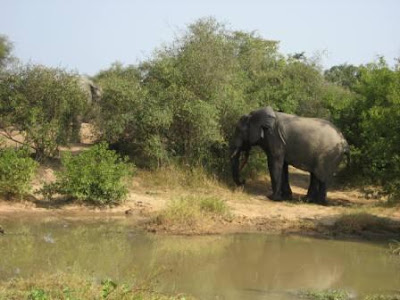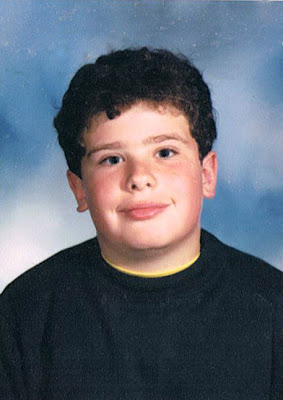We're Back
Well, as many of you already know, Amanda and I had the luxury of returning home for the month of June (and gorging ourselves on home cooked food) while we awaited the start of our new job in Ghana. Yes, we decided we were not quite ready to leave Africa, but a change of venue was needed. With that, an opportunity to fly home presented itself as it was either take advantage of the already booked return flight and buy a new ticket back or lose the return flight and buy a ticket back. The choice seemed fairly obvious.
Our stay with ASPI, although rocky at times, proved educational and eye-opening. The experience forced us to adjust to cultural differences in all facets of life, including personal and work, and taught us much about who we are. In the end, we left ASPI with what we believe to be some quality work, including a detailed operational manual for the microfinance program, a whole new brand and image for the organization, including a new logo, stationary, brochure and website (www.aidezsmallproject.org), and a proposal for a $1.3 million dollar grant that appears to be attracting considerable interest from USAID.
Our new job, which we start tomorrow, finds us doing very similar activities, although in a different location (Ho) and with a better run, more organized institution. Village Exchange Ghana (VEG) was started by a French mother and her son with the intentions of providing family planning services and jobs to teenage mothers. Having been here for five or six years, the mother and son are looking to transfer the organization to local ownership. This is where Amanda and I come in, as we are here to help that transition be as smooth as possible. Like I said earlier, we start tomorrow so there will plenty more time for talking shop. For now, I’m more interested in telling you (or showing you) how we spent the month of July.
With working starting in August, Amanda and I decided to spend a month traveling in Burkina Faso and Mali. Both French speaking countries, we were understandably a little nervous about getting around, but as in Ghana the people are warm and friendly, and always ready to help, even with the language barrier.
We started in Burkina Faso, where with the help of a guide who speaks passable English, we rented mopeds for three days. We saw hippos from a canoe no more than 20 yards away, swam in waterfalls, and hiked the Sindou Peaks, which are some crazy rock formations that seem to be a landscape out of Lord of the Rings. Originally, we viewed Burkina Faso as a country we had to get through just to get to Mali, but the country left a lasting impression on us. We will remember the red dirt roads, the village architecture (different from Ghana or Togo), the food (some of the best beef kabobs I’ve ever eaten) and the tree lined streets of Bobo-Dioulasso.
After a week in Burkina, we got on a bus for Mali. Our destination, no more than 300 miles away, ended up taking 20 hours on a very uncomfortable bus which included a six hour nap at the border. Of course, with the language barrier, it took Amanda and me about three hours to realize that the bus was stopped simply so the driver could sleep!
In Mali, our major focus was to get to a place called Dogon Country. A very peculiar place, Dogon people followed the inhabitants before them (the Tellum – a tribe of pygmy people) by building their homes in the wall of a giant escarpment. The dwellings date back to the 8th century but are still very much intact. We spent four days and three nights hiking from village to village and sleeping on the roofs of peoples’ homes. Unlike their ancestors, present day Dogon live on the valley floor closer to their water source and farm lands. We were even lucky enough to be invited to a traditional wedding in one of the villages, where we got to watch a millet pounding competition between friends and family of the first wife against the friends and family of the new wife. Yes, the groom was already married, so this was his second wife. We felt blessed to witness something so spontaneous and genuine.
Our last big leg of the trip was a three day boat ride up the Niger River heading towards Timbuktu. The boatride itself turned out to be more enjoyable then our stay in Timbuktu. We traveled on a public pinasse (a giant dugout canoe, essentially) loaded with passengers and cargo, including rice, coal, sheep, and goats. One had to scale the side of the boat just to get to the bathroom, which consisted of a hole leading to the river.
After three days, we arrived in Timbuktu - the elusive and mythical kingdom that used to symbolize the far reaches of the world and is now equipped with a modern airport. The place itself was somewhat of a disappointment, but our intentions were to get out of the city and into the Sahara. The next day we hired a guide and camels to take us out in the desert for the night. Due to time constraints and recent kidnappings of tourists in northern Mali, Amanda and I decided that one night in the desert was enough. Amanda had already done the camel trek into the Sahara when she was in Morocco, so I was the only one feeling giddy when I saw the camels we had hired. She warned me that they can be pretty uncomfortable, but I didn’t care, I didn’t want to believe it. Well, I can now say that I’ve ridden a camel and have no intentions of getting on another one. They are truly uncomfortable!
I was hoping the Sahara would be rolling sand dunes as far as the eye can see, but it turns out that it takes seven days of trekking from Timbuktu before the Sahel gives way to the Sahara. (The Sahel is the name for the strip of land that borders the Sahara. The flat terrain is covered with thorny low bushes and scrubs.) That night, we watched a huge wall of sand blow in on us, followed by torrential rain. Amanda and I had to battle a herd of goats trying to enter our tent to escape the storm. In the end, Timbuktu and the Sahara did not live up to my expectations but at least I can say I’ve been to both.
I realize I said a lot, so if you made it this far, thanks for sticking with me. I will let the pictures do the rest of the talking. As for future postings, I will try to make them shorter and more often. More to come soon…

























































